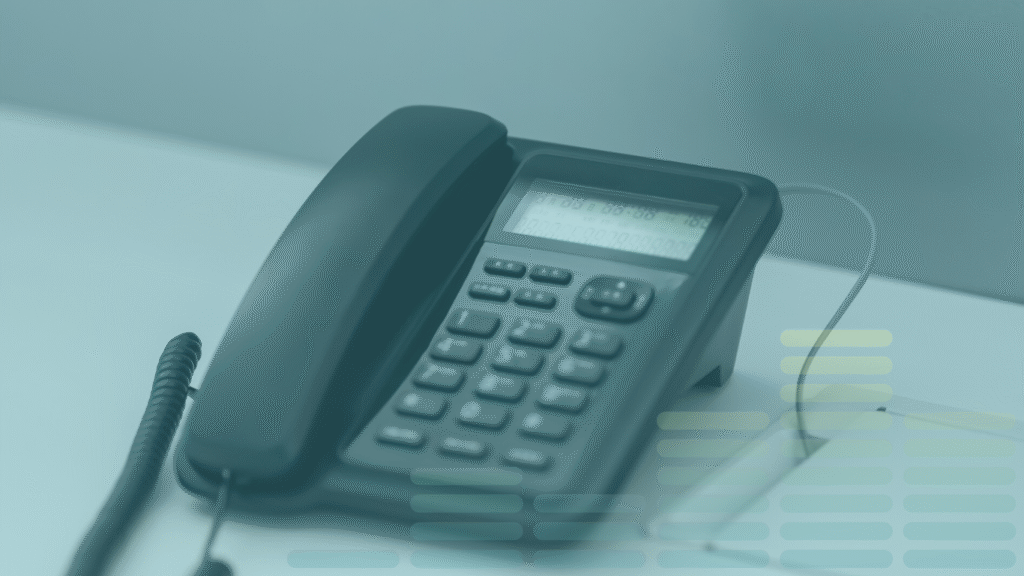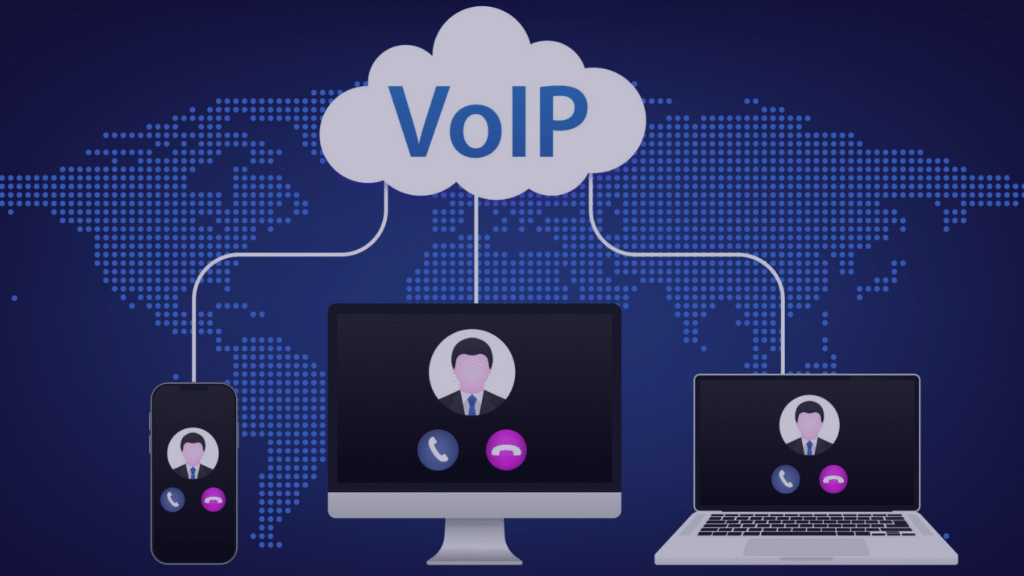Business Phone Systems For Small Business
07/22/2025
Choosing the Right Solution for Your Business | Business Phone Systems
When customers call your business, the experience they have on the phone speaks volumes about your professionalism. You might be the best at what you do, but if a client has a poor experience trying to reach you, you risk losing the sale.
If you’re a small business owner, choosing the right phone system can feel overwhelming but it doesn’t have to be. In this guide, we’ll walk you through your options, outline the pros and cons of each, and show how your choice of phone system can directly impact your bottom line.
Why Your Phone System Matters
A modern phone system does more than just connect calls. It shapes your customers’ impression of your company, helps your team work more efficiently, and ensures callers feel heard, even when they’re placed on hold. It can also provide valuable insights through call analytics, such as tracking call volumes, peak times, average hold times, and customer behavior. These metrics help you identify trends, optimize staffing, and improve the overall caller experience.
Wondering why the right phone system is so important?
- A good phone system ensures clear, reliable communication.
- It routes calls seamlessly to the right person or department (assuming your call tree is set up properly).
- It supports custom auto attendants and voicemail greetings — and makes them easy to manage.
- It allows you to upload custom on hold marketing messages or music.
- It’s scalable, so it can grow with your business.
If your phone system can’t support these features, you’re business is missing out on opporunities to impress and retain customers.

Types of Business Phone Systems | Business Phone Systems For Small Business
Instead of doing a pile of research, we have put all the information you need in one spot. Let’s take a closer look at the most common options for small business.
Analog (Traditional) Phone Systems
Traditional phone systems use standard landlines and physical hardware installed on-site. They are known for their reliability, offering clear call quality and consistent service without relying on an internet connection. However, they come with some significant limitations for modern businesses. These systems lack advanced features like call analytics, which means you can’t easily track call volumes, wait times, or customer behavior; insights that are crucial for improving service and staffing. They also don’t integrate with digital tools or apps, making it harder to connect your phone system with your CRM, email, or other business software. In addition, traditional systems are often expensive to maintain because they require specialized technicians for repairs and upgrades, and they aren’t very flexible when it comes to scaling or adding new lines as your business grows.
While reliable, they may not meet the needs of businesses looking for a more dynamic and data-driven solution. But, enhacing the call waiting experience is always possible!

PBX (Private Branch Exchange)
On-premises phone systems use dedicated hardware installed at your business to route calls both internally and externally. These systems are designed to handle multiple phone lines, extensions, and voicemail boxes, making them a popular choice for larger offices that need a structured call flow.
When properly configured, they can also support custom on hold messaging and music, giving you the ability to create a more polished caller experience. One of the main advantages of an on-premises system is reliability because the equipment is physically located at your site and doesn’t rely on internet connectivity, call quality tends to be very stable. However, they come with higher upfront costs for the hardware and installation, and ongoing maintenance can also add to the expense.
On-premises systems can be less flexible than cloud-based alternatives, requiring professional support for upgrades or changes, but they give you full control over your phone infrastructure and are ideal for businesses with strict security requirements or poor internet access.

VoIP (Voice over Internet Protocol)
VoIP (Voice over Internet Protocol) phone systems use your internet connection to make and receive calls, eliminating the need for traditional phone lines and equipment. They are highly flexible, scalable, and often more affordable than on-premises or landline systems, making them an attractive option for businesses of all sizes.
VoIP systems are ideal for supporting remote workforces, offering mobile apps and seamless integration with CRMs and other business software to keep your team connected and efficient from anywhere. They also work well with custom on hold music and messaging, allowing you to create a professional, branded experience for callers.
One of the biggest advantages of VoIP is how easy it is to add or remove lines and features as your business grows. However, because they rely entirely on your internet connection, you’ll need a strong and reliable network to ensure call quality and avoid disruptions. For businesses with solid internet infrastructure, VoIP offers a modern, cost-effective, and feature-rich solution. If you have an unstable internet connect, calls will be choppy or will not connect at all.

Cloud-Based Phone Systems
A cloud-based phone system is a type of VoIP service that is hosted entirely in the cloud, with no need for on-premises equipment beyond the phones themselves (or even just a computer or mobile app). This makes it incredibly easy to set up and maintain, with the provider handling all the hardware, software, and updates on their end.
Cloud systems scale effortlessly as your business grows, allowing you to add users, extensions, and features without the hassle or expense of additional equipment. They are particularly well-suited for multi-location businesses, ensuring all sites are connected under one unified system. Many cloud-based solutions also include built-in support for music on hold, voicemail greetings, and even advanced features like call analytics, auto-attendants, and CRM integrations. The convenience and flexibility make cloud systems an excellent choice for businesses looking for a modern, low-maintenance communication solution that still delivers a polished experience to callers.

The right phone system for your business depends on your specific needs, location, and the technology available in your area. Each option, from traditional landlines to VoIP and cloud-based systems, has its own strengths and considerations, so it’s important to evaluate what works best for your operations. In rural areas, for example, limited internet infrastructure may influence your decision, making traditional or on-premises systems more practical. On the other hand, businesses in urban settings with reliable high-speed internet might benefit most from the flexibility and advanced features of VoIP or cloud-based systems. By assessing your business goals, caller experience priorities, and the technical options in your region, you can choose a system that supports both your team and your customers effectively.
Common Mistakes When Choosing a Phone System
Even smart, experienced business owners can make common mistakes when choosing a phone system.
One of the most frequent missteps is opting for the cheapest option without thinking about future scalability, which can lead to costly upgrades down the line. Others overlook how the system manages important features like hold calls, voicemail, and caller experience, all of which shape how customers perceive your business. Many also forget to ask about proper licensing for on hold music services, which can expose them to legal issues if ignored. And in today’s work environment, it’s easy to underestimate the importance of supporting remote or hybrid teams, leaving employees without the tools they need to stay connected.
Business Phone Systems For Small Business : Taking the time to consider these factors upfront can save money, improve efficiency, and enhance customer satisfaction.
Some other common mistakes are:
- Failing to train staff on how to use the system properly
- Choosing a system with too many unnecessary features (paying for what you don’t use)
- Underestimating the importance of a clear, easy-to-navigate call tree or auto-attendant
- Forgetting to regularly update voicemail greetings, on hold messages, and extensions
- Ignoring compatibility with existing hardware or CRM software
- Not asking about ongoing maintenance costs and hidden fees
- Overlooking the provider’s customer support availability and quality
- Not planning for downtime or disaster recovery options (backup solutions)
- Assuming all VoIP services work equally well regardless of internet bandwidth

How Your Phone System Impacts Your Bottom Line
Here’s where our expertise makes the difference. After you choose your phone system, the provider’s main goal is to get your lines up and running as quickly as possible so the system is billable and functional. While they excel at the technical setup, they often overlook the importance of branding, caller experience, and professionalism. Their expertise is in the technology, not in creating a positive, polished customer interaction.
That’s where we come in. We know how to design an effective and professional call tree, both in script and audio. We create messaging that reflects your brand, reassures callers, and keeps them engaged while navigating your system. We offer access to a wide range of voice talent, clear and concise scripting, and competitive industry pricing.
Below are some of our top recommendations for business implementing a new phone system:
- Plan your call tree carefully. Keep it simple, intuitive, and customer-friendly.
- Use a professional voice talent to ensure clarity, warmth, and consistency.
- Invest in branded on hold messaging and music rather than default silence or radio.
- Make sure voicemail greetings are updated, polished, and reflect your current hours and information.
- Test your system thoroughly before launch to catch any routing or audio issues.
- Schedule periodic reviews of your messaging to keep it fresh, relevant, and aligned with your business goals.
- Ensure your scripts are written with customer experience in mind, concise yet informative.
- Work with professionals who understand both the technical side and the branding side of phone communications, like an on hold marketing company.

Tips for Choosing the Right System
If you’re still in the process of choosing a phone system and you’re here to make a more informed decision, you’re in the right place. Over decades of working with countless phone systems and providers, we’ve learned what really matters. Below are some important questions to ask when evaluating a provider. These will help ensure the system you choose fits your business today and grows with you tomorrow:
- Does this system allow me to upload custom audio files for hold music and messaging?
- Can I easily create and manage different messages for different departments or locations?
- Is the system scalable if I hire more staff, expand services, or open new locations?
- Does it support multi-language prompts if my customer base is diverse?
- What kind of support and training is provided — and is it included in the cost?
- Are there hidden fees for adding features or making changes later?
- How reliable is the system during power outages or internet disruptions?
- Does it integrate with my existing CRM or business software?
- Is there an option to track call analytics, such as call duration, missed calls, and peak times?
- How easy is it to update hold messages and auto-attendant scripts as my business evolves?
- Are licensing and legal requirements for music on hold already covered by the system?
- What’s the average response time for support if something goes wrong?
Taking the time to ask these questions now will save you frustration and unexpected costs later. It also helps you find a provider that not only delivers the technical features you need but also supports the kind of customer experience you want to create.

Recommended Business Phone Systems
While we don’t sell phone hardware ourselves, we’ve worked with many businesses and have seen which systems deliver reliability, flexibility, and professional features and which don’t. Below are a few trusted options you might consider, depending on your size, industry, and needs:
- Avaya Phone System — A versatile, enterprise-grade platform that also scales well for small businesses. Known for its reliability and advanced features, it’s a solid choice for businesses of any size looking for robust functionality.
- Mitel — A strong option for PBX and VoIP hybrid setups, particularly suited to medical clinics, hospitals, and organizations requiring dependable internal call routing and on-premises control.
- Genesys — Ideal for larger enterprises and call centers, this platform offers advanced customer experience tools, analytics, and seamless omnichannel integration.
Each of these systems supports professional on hold messaging and music when set up properly, so you can deliver a polished, branded caller experience.
We also strongly recommend finding a local provider or reseller of these reliable systems. Not only does this support other small businesses in your area, but it also usually means better customer service. Local providers tend to offer more personalized attention, faster support, and a deeper understanding of your unique needs — compared to the big, faceless national companies that can leave you stuck in long queues or with unresponsive help desks.
The best system for your business depends on your goals, budget, and how much you value scalability, integrations, and analytics. If you’d like, we can help you prepare branded scripts, recordings, and hold messaging that fit perfectly with whichever system you choose.
Ready to Upgrade Your Caller Experience?
Your phone system is more than just a way to answer calls — it’s the backbone of your customer communications. And your on hold experience is a vital part of that impression. Every time a customer calls, you have the opportunity to show them your professionalism, reinforce your brand, and keep them engaged — even while they wait.
Here’s how you can take the next step:
📞 Choose a system that supports professional audio.
Not all systems are created equal, make sure yours can handle custom audio files for hold messages, greetings, and prompts.
📞 Work with experts to craft custom on hold messaging.
A thoughtful, professionally produced message keeps callers informed, engaged, and reassured they’re in the right hands.
📞 Give your callers the branded experience they deserve.
Don’t let silence, static, or generic music ruin the impression you’ve worked so hard to build.
We’re here to help you make it happen. Contact us today to talk about upgrading your system and creating messaging that impresses every caller — and keeps them coming back.
Curious about how COHM can elevate your business? Don’t hesitate to reach out to us today. We prioritize prompt customer service and guarantee a response within 24 hours.
Ready to Collaborate?
"*" indicates required fields